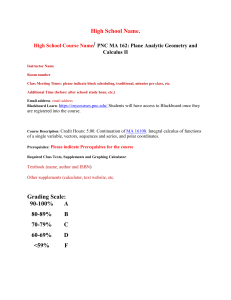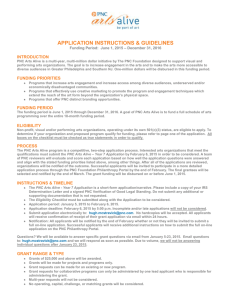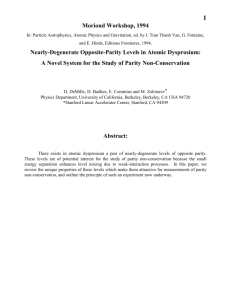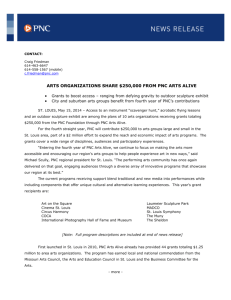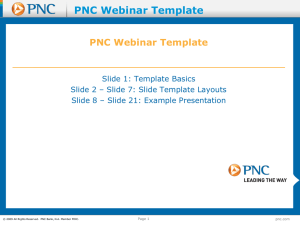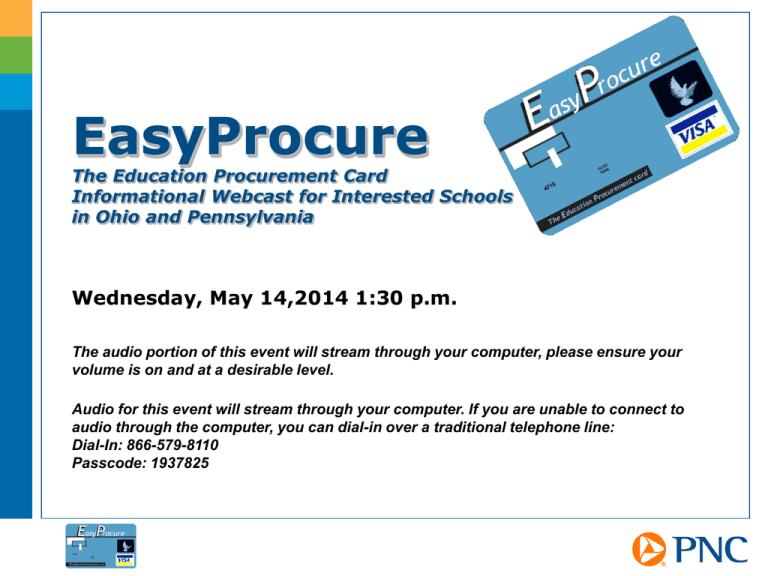
EasyProcure
The Education Procurement Card
Informational Webcast for Interested Schools
in Ohio and Pennsylvania
Wednesday, May 14,2014 1:30 p.m.
The audio portion of this event will stream through your computer, please ensure your
volume is on and at a desirable level.
Audio for this event will stream through your computer. If you are unable to connect to
audio through the computer, you can dial-in over a traditional telephone line:
Dial-In: 866-579-8110
Passcode: 1937825
Today’s Presenters
• Jay Himes, EasyProcure & PASBO
• Scott Fratturelli and Kurt Hanna, PNC
Treasury Management
• Brian Wilson, Hilliard City SD (OH)
• Christine Hakes, PRSBA, Camp Hill SD
(PA)
• An Tran, PNC Public Finance Group
2
Objectives of Today’s Discussion
• Introduce EasyProcure, a joint venture between PASBO,
PSBA, PASA, PSDLAF, OASBO, OSBA and BASA
• Provide insight into procurement cards and the fast
changing commercial payments landscape
• Discuss economic benefits of integrating Purchasing Cards
into the Procure-to-Pay Process
• Share best practices associated with those entities that
have effectively implemented a payment optimization
strategy to generate measurable bottom line revenue and
cost savings
• Discuss how to join
• Q&A
3
What is EasyProcure?
Joint Venture of:
• Program created in PA in 2005 – Ohio joined in
2010
• No fee PNC Bank Visa© purchasing card
(Accepted anywhere Visa© commercial cards are
accepted)
• Rebates - The rebates are based upon program
spend from June 1 to May 31 earning a rebate
on the first dollar you spend!
– An aggregate total of participants’ purchases in both
states during a 12 month period determines the level of
rebate earnings
4
What is EasyProcure?
• PNC—State of PA procurement card provider
• Rapid growth, rapid acceptance
• More schools, more spend, more rebates to
schools
• PNC acquisition of National City Bank opened the
door for the joint effort between PA and Ohio in
2010
• Joined together for spend aggregation but
independent state governance and policy.
5
EasyProcure-Program Growth
EasyProcure Program Growth
$90,000,000
250
$80,000,000
200
$70,000,000
$60,000,000
150
$50,000,000
$40,000,000
100
$30,000,000
$20,000,000
50
$10,000,000
$-
0
2005-2006 2006-2007 2007-2008 2008-2009 2009-2010 2010-2011 2011-2012 2012-2013
Fiscal Year
Spend
Participants
6
Projected
EasyProcure Growth in Participants
222
184
141
116
88
72
54
34
7
Jan-05
Jan-06
Jan-07
Jan-08
Jan-09
7
Jan-10
Jan-11
Jan-12
Jan-13
Combining Spend Increases Rebates for Both
States and Their Participants
PA Program Spend (Not including large ticket items)
PA Program Spend (Large ticket items)
Basis Points on Regular Spend
Basis Points Earned Large Ticket
PA Royalties Earned
Ohio Program Spend (Not including large ticket items)
Ohio Program Spend (Large ticket items)
Basis Points Earned
Basis Points Earned Large Spend
Ohio Royalties Earned
Total Royalties - Earned Seperately
Total Combined Spend
Actual Rebate Earned
Difference Between Royalties Earned Seperately & Combined Royalty
PA's Portion of Total Spend
Ohio's Portion of Total Spend
PA's Portion of the Addl Royalty
Ohio's Portion of the Addl Royalty
8
EasyProcure Resources
• www.easyprocure.org
–
–
–
–
–
–
–
–
Auditor General Guidance
Review by Counsel
Sample Board Resolution (currently being revised)
Merchant Category Code Groups (MCC Groups)
Potential Areas for Card Usage
Frequently Asked Questions’
School Entities Currently Using EasyProcure Cards
Implementation Guidelines
• www.pasboerc.org
(downloadable documents)
– Guidelines, procedures, user agreements, etc.
– Documents available Upon request
– PSBA Board Policy – Procurement Cards
– Visa© Purchasing Card Agreement and Resolution of
Extension of Credit available upon request
9
Changing Payment Landscape
10
What is a Procurement Card?
A procurement card is similar to a credit card but with many internal controls. Its purpose
is to streamline purchasing to reduce manual paperwork, which in turn will reduce
administrative costs. It is considered a method of payment as well as a method of
procurement.
Provides streamlined process to authorize,
track, pay, and reconcile purchases
•
Control at point of sale
•
Automated posting to A/P or G/L
Eliminates manual paper based PO/Check
process
Typically used for repetitive purchases and petty cash type items
•
Employees deal directly with supplier via phone, fax,
internet, or in person
11
What is a Procurement Card?
Provide increased control over purchases
Structured as corporate bill, payment, and
liability
•
Business office receives consolidated invoice for payment
•
Cardholders receive memo statements for reconciliation
12
Payments Mix
Check displacement & payment integration with AP are powering
electronic payments.
Source: AFP Electronic Payments Survey data for 2004-2010; .2011 First Annapolis Commercial Card Market Landscape
13
Benefits of Procurement Card Usage
14
Benefits of Card Usage
Why businesses and public organizations are moving purchase
transactions onto commercial cards
Stronger control over fraud and misuse
•
Limits individual employee spend
•
Merchant category blocking
•
Transaction size and spending limits
•
Provides spending analysis reports grouping charges by industry/vendor based on merchant category
codes
Increased productivity of employees
•
Eliminates petty cash and purchase orders, streamlining inefficient purchasing paperwork
•
Reduces use of personal cards, simplifying and accelerating employee reimbursement
•
Timely access to information through web based reporting tools
Financial Benefits
•
Card users gain an average of 15-20 days of extended float
•
Cash rebates available when spending goals are achieved
•
Check and mail costs and bank fees reduced
•
Obtain vendor discounts for quicker payment
15
Benefits of Card Usage
Material differences in the economics of various payment
alternatives create opportunities to pursue an optimum
payment mix and a winning proposition.
Customer
Average Cost Per Transaction*
Check
Incremental Expense: ($0.64)
(bank fees and estimated mail remittance fees)
ACH
Incremental Expense: ($0.12)
Wire
Incremental Expense: ($7.00)
Commercial Card
Incremental Revenue Share:
$3.75
(Estimated 75 basis points)
*Based on a $500 transaction
16
Procurement Card Best Practices
17
Best Practices
Vendor Match
• Process:
– Provide bank with a vendor file
– Bank will match the file against our extensive bank and
VISA database to determine which of your current
vendors are already accepting commercial cards
– Bank will provide you with a detailed analysis outlying
all accepting vendors and potential return on investment
• A Vendor Match Analysis is an effective tool for:
– Identifying target vendors for commercial card
payments
– Determining spend and rebate potential
18
Best Practices
*Example for discussion only
19
Best Practices – Hilliard City Schools
Commonalities of High Performance
Commercial Card Programs:
• Establish realistic and achievable goals
• Appropriate distribution and use of cards
• Enforce policy/procedures, security management
and spend controls; Sample policy and procedure
guide
• Establish communication & training activities
• Timely reconcilement of accounts
20
Best Practices – Hilliard City Schools
Utilizing Online System:
• Card Management
– Issue new cards
– Change limits and cancel cards in real time
– Update MCC restrictions
• Utilize program technology & interfaces
– Automated Posting
– G/L
– Vendor File
21
Best Practices – Hilliard City Schools
Risky Areas to Monitor:
1. Use of cards at unauthorized vendors
2. Types of purchases (bid requirements)
3. Personal Use
22
CAMP HILL SCHOOL DISTRICT
Small School Case Study
23
Camp Hill School District - Small School Case Study
• About 25 active cards with varying limits:
–
–
–
–
–
–
–
–
–
–
Superintendent
Business Administrator
Each Principal & building
Food service operations
Band program
Home Economics program
Four maintenance (gasoline)
Technology
Athletics
Other (special programs, grants, drama)
24
Camp Hill School District - Small School Case Study
• Use with most vendors for:
–
–
–
–
–
–
–
Technology equipment
Copiers, equipment contracts
Gasoline
Transportation services
Repairs, maintenance contracts
Instructional materials & supplies
Office supplies
25
Camp Hill School District - small school case
study
• Eliminated purchase orders and utilized log
(budget spreadsheet) for tracking cardholders
budget.
• Cardholder follows up with documentation (pkg
slips; order form) and coding.
• Monthly cardholder submits to business office.
After clerical review (excel file created), Business
Administrator authorizes the total District Pcard
transfer.
26
Camp Hill School District - small school case study
Benefits:
Improved efficiencies – less: ”paperwork”,
follow-up & time
Quick turnaround of purchasing and accounts payable means
materials are in the classroom sooner and full purchase
information is known sooner.
Rebates
Customer satisfaction (faculty/staff and vendors)
Cautions:
Monitor activity – on-line and monthly statements
Clarify responsibility to cardholders (procedures &
agreement)
27
Joining the Program
• Step One:
– One Page application – accessible online
• Contact Information section
• Entity Information section, most important is
– #3 - Monthly credit limit requested for
your program - must be provided
• Three years of audited annual financial
reports
– Already a PNC procurement card user?
• Same one-page application as above
• Letter of authorization on school letterhead
to transfer; no need for reports
28
Joining the Program
• Step Two:
– After credit limit is approved by PNC,
representative will make an appointment with
you to complete:
• PNC Resolution for Extensions of Credit
• PNC Master Resolution and Signature Card
for New PNC Account (if applicable)
• Step Three:
– Card program setup process - PNC
Implementation Team will contact program
administrator directly
29
Q&A
At this time, we
encourage you to
participate in the
Question and Answer
portion of the webinar.
30
Thank You for Joining Us!
Scott Fratturelli
Christine Hakes, PRSBA
Vice President, Treasury Management
Business Mgr./Board Secretary, Camp Hill SD
Telephone:
614-463-7332
Email:
scott.fratturelli@pnc.com
Telephone: 717-901-2400 Ext. 2412
Email:
chakes@camphillsd.k12.pa.us
Kurt Hanna
Brian Wilson
Vice President, Treasury Management
Treasurer, Hilliard City Schools
Telephone:
216-222-2628
Email:
kurt.hanna@pnc.com
Telephone: 614-921-7000
Email:
Brian_Wilson@hboe.org
Laura Custer
An Tran
EasyProcure OH Program Manager
EasyProcure PA Program Manager
Telephone:
614-463-7553
Email:
laura.custer@pnc.com
31
Telephone:
215-585-4978
Email:
an.tran@pnc.com
Disclosure
The web seminar and/or materials were prepared for general information purposes only and are not
intended as legal, tax, accounting or financial advice, or recommendations to buy or sell securities or
currencies or to engage in any specific transactions, and do not purport to be comprehensive. Under no
circumstances should any information contained in the web seminar, and/or materials be used or
considered as an offer or a solicitation of an offer to participate in any particular transaction or strategy.
Any reliance upon any such information is solely and exclusively at your own risk. Please consult your own
counsel, accountant or other advisor regarding your specific situation. Any views expressed in the web
seminar and/or materials are subject to change without notice due to market conditions and other factors.
PNC is a registered mark of The PNC Financial Services Group, Inc. (“PNC”). Bank deposit, treasury
management and lending products and services, and investment and wealth management, and fiduciary
services are provided by PNC Bank, National Association, a wholly-owned subsidiary of PNC and Member
FDIC. Lending products and services, as well as certain other banking products and services, require
credit approval. PNC does not provide legal, tax or accounting advice.
©2012 The PNC Financial Services Group, Inc. All rights reserved.
32


